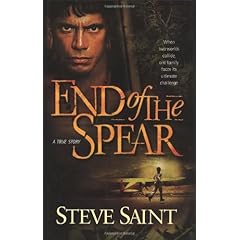
The End of the Spear by Steve Saint
It's hard to grow up in the American Christian culture without being familiar with the tale of the 5 young missionaries who were speared to death by the fierce "Auca" Indians in Ecuador in 1956. I remember reading Elizabeth Elliott's Through Gates of Splendor sometime when I was in junior high or high school. I recall several college sermons quoting Jim Elliot: "He is no fool who gives what he can not keep to gain what he can not lose." And then there was the Twila Paris song centered around that same quote.
When I was doing my student teaching in Ecuador, I jumped at the chance to take a day-long bump truck ride to Shell Mera to the edge of the Amazon rain forest. Shell is the airport out of which Nate Saint's flying operations to the "Auca" (now known as Waorani) were based. When I was in Shell, the big news was that parts of Nate Saint's plane had been recovered on the beach where the five men were murdered. I got to touch some pieces of the plane with my very own hands.
All that might make it sound like I would rush out to read Steve Saint's book recounting how he and his family went to live with the very people that had killed his father. On the contrary, I put off reading this book for a while. First of all, I was scared it would be some more of the meaningless drivel that passes for "Christian" literature these days. Secondly, I've been reading about the destruction to the Amazon basin by petroleum companies with the help of American missionaries, and I was skeptical of Steve Saint's motives.
I was right about one thing: as a piece of literature, this book is pretty awful. Steve Saint is not an accomplished writer. However, I find that strangely reassuring. It was not a book that has been massaged by the media machine. Rather, it seems to be a pretty honest and humble account of Steve's struggle to help the Waorani empower themselves without allowing them to become dependent on him. He did mention the very real struggles for survival that this "stone age" tribe is facing as it sits on top of oil-rich land although he did not go very deeply into this topic. Saint's writing is the most vibrant and humorous when he describes his personal relationship with different members of the Waorani tribe and their attempts to interpret each other's cultures. I enjoyed the book more than I expected to and it is intriguing to see how the Waodoni are continuing to "walk God's trail" as they learn to deal with the 21st century.
Did anyone else here read it? What did you think?
3 comments:
i haven't read it yet, but i saw the feature film, which really just made me want to watch the documentary about steve saint. it's worth watching, but again - not great art.
also, i definitely think putting noodles on your dog's head is way cooler than putting clothes on him. :-)
ames
I read it and really liked it. I was interested the whole time and I think what he did and does is great.
Kris
i didn't read it, but i understand the struggle that comes from people trying to do what they feel they are called to do (missions) and the end result that so often occurs when western culture invades a 3rd world country: ruining culture and environment in the name of profit and advancement.
grrr.
Post a Comment